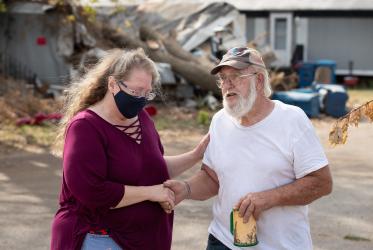Later in 2007 she was asked to identify patients with obstetric fistula in the community and bring them forward for corrective surgery aboard Mercy Ships. Mercy Ships is an international charity that operates hospital ships in the world, providing free health care and other humanitarian aid.
The nurse, with 11 years experience, objected to her newly given task because, according to her, “obstetric fistula did not exist in Ghana.” Surprisingly, or rather unsurprisingly, she found 10 cases, two of which were from her neighbouring village. She brought the ten women to the coast and they underwent corrective surgery on the Mercy Ship. It was striking to Mantey how fistula was actually hiding in plain sight, and how transformative the surgery was to the lives of the affected women. This marked a new journey, for herself and the hospital and hope for the many women suffering from obstetric fistula in Ghana.
Obstetric fistula
An obstetric fistula is an abnormal opening between a woman’s vagina and bladder and/or rectum causing her urine and/or faeces to continually leak out through the vagina. The affected women are unable to control bodily functions of urination and defecation, they are constantly soiled and wet and smelly. Their pain and shame – aggravated by recurring infections, damage to vaginal tissue that makes sexual activity impossible and almost certain marital breakdown – make fistula sufferers social outcasts, shunned by society, unprioritized by healthcare providers, forgotten by policy makers,
The medical condition itself is caused by complicated childbirth, mainly obstructed labour, occasioned by early (teenage) pregnancies, poor access to maternal and obstetric care, lack of skilled birth attendants, sexual assault, harmful cultural practices, stunted growth, and other underlying social factors.
Prevention requires addressing these issues in a systemic and sustainable way. Early detection of at-risk women and immediate bladder catheterisation help tissue healing and avoids development of fistula. Obstetric fistula can be repaired by simple surgery.
According to WHO, obstetric fistula occurs primarily in sub-Saharan Africa (1.6 cases per 1,000 women) and South Asia (1.2 cases per 1,000 women), with about 2 million women living with fistula, and between 50,000 and 100,000 new cases each year. That’s the unsurprising part of Mantey's identifying 10 fistula cases in her initial outreach.
Mercy Women’s Catholic Hospital fistula unit
Mercy Women’s Catholic Hospital under the leadership of Cardinal Tuckson, then archbishop in Ghana, established a dedicated fistula unit in 2010 to provide corrective surgery on an ongoing basis, explained Mercy Achau, officer-in-charge of the hospital. There was initial support from overseas church donors, and later some from the government under the Ministry of Gender, and occasional support from local banks and politicians.
Operations of the fistula unit involve identifying the women in community clinics, and when there are at least 10 cases, running a fistula camp. Besides the medical care, the women are provided transport to and fro, food during their stay, and hygiene materials. This is necessary because of the socioeconomic consequences that the women suffer. Medical specialists are brought in from the national teaching hospital to conduct the operations. Initially the success rate was around 60% which eventually attributed to poor nutritional status of the women. So the length of stay was extended by adding two weeks intensive feeding before surgery. The success rate has now reached 80%, with at least three weeks total hospital stay.
A far cry for help
With less than 100 operations performed annually, service provision at the fistula unit is a far cry from the need on the ground. There is a huge backlog of cases and thousands of new cases annually. With no funds to provide services, the fistula unit is almost deserted with Mantey having no good news to give the women with fistula who call her to ask when they will have their life-changing surgery.
A further cry are plans to provide support for economic rehabilitation to the women after the surgery like skills training (e.g., hair dressing, baking, soap making) and startup capital.
This is unlike the optimism expressed by authors in a 2006 WHO document: “Thankfully, fistula has recently begun to gain international attention. Efforts to prevent and treat fistula have … very limited political, financial or institutional support. Now, however, there is a growing global momentum to reduce drastically the incidence of obstetric fistula.”
Even though in many countries church hospitals are the only ones providing fistula surgeries, the need remains extremely high in affected regions, and therefore more should be done. We hear the silent cries of women suffering from obstetric fistula, cries for help, for abundant life that our Lord promised.








